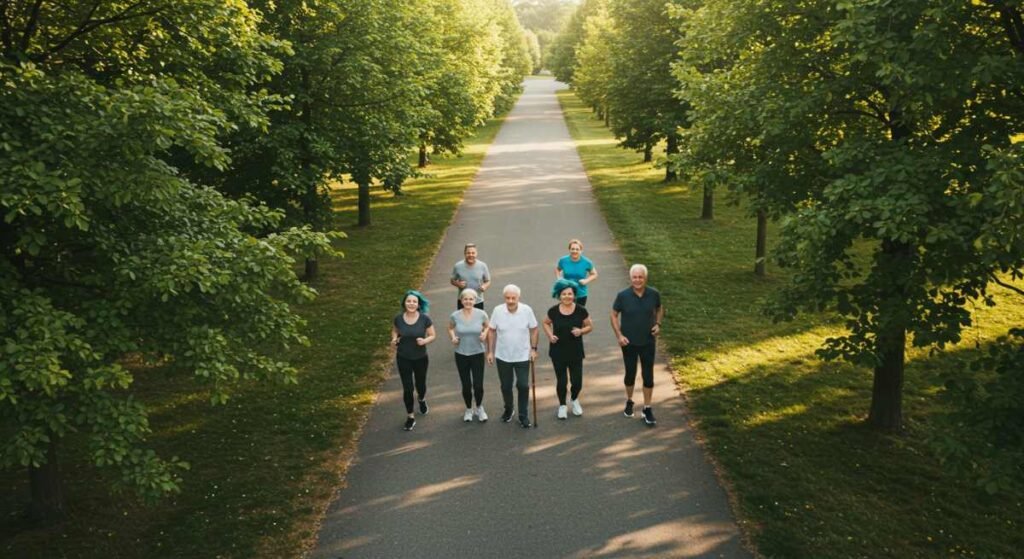Introduction
Daily walking benefits are numerous and often underestimated. Right from the start, walking daily boosts your cardiovascular health, strengthens muscles, and enhances mental clarity. Moreover, it’s an accessible form of exercise for people of all ages and fitness levels. Additionally, walking can be easily integrated into daily routines, such as a short walk after meals or a morning stroll. Finally, studies consistently show that regular walking leads to improved mood and reduced stress levels.
Daily Walking Benefits to Boosts Cardiovascular Health
To begin with, one of the primary daily walking benefits is improved cardiovascular health. Engaging in brisk walking for at least 30 minutes each day boosts blood circulation, strengthens the heart muscle, and lowers blood pressure. Furthermore, consistent walking reduces your risk of heart disease by helping regulate cholesterol levels, a critical factor for long-term healthy living.
Moreover, walking supports maintaining a healthy weight, thereby decreasing the strain on your heart and other organs. In fact, Dr. Thomas Frieden, former director of the CDC, famously stated that walking is “the closest thing we have to a wonder drug” for heart health (CDC Source).

Enhances Mental Health Through Walking
The Connection Between Physical Activity and Emotional Well-Being
Not only does daily walking improve physical health, but it also significantly boosts mental health. When you engage in moderate exercise like walking, your brain releases endorphins natural mood lifters that combat stress, anxiety, and depression.
Additionally, spending time walking outdoors, especially in green spaces, enhances cognitive function and emotional balance. According to a 2018 study published in Health Promotion Perspectives, individuals who engage in daily walking report better emotional regulation and lower stress levels.
Moreover, walking acts as a moving meditation, allowing your mind to relax and process thoughts more clearly. This dual benefit makes it a simple yet effective strategy for improving both physical and mental health.
Supports Healthy Living with Weight Management
An Easy and Effective Way to Stay Fit
Another major advantage of daily walking is its impact on weight management, which is crucial for a healthy lifestyle. Unlike more intense workouts that may be intimidating or hard on the joints, walking is gentle, accessible, and sustainable for most people.
Furthermore, studies show that walking burns calories, regulates appetite hormones, and improves metabolism. Incorporating daily walks after meals, particularly dinner, has been linked to better digestion and more stable blood sugar levels, supporting overall healthy living.
Finally, walking doesn’t require expensive equipment or a gym membership, making it a cost-effective, lifelong investment in your health.
Easy Ways to Make Daily Walking a Habit
Integrating Walking into Your Healthy Lifestyle
Building a habit of daily walking is simpler than you might think. Start by setting achievable goals, such as a 10-minute walk after each meal, and gradually increase your time and pace. Additionally, consider walking with a friend or listening to your favorite podcast to make the activity more enjoyable.
Moreover, using a pedometer or fitness tracker can help you stay motivated by showing your progress over time. Whether it’s a leisurely stroll in the park or a brisk walk to work, every step counts toward a healthier, happier you.
Conclusion: Embrace Daily Walking for a Healthier, Happier Life
In conclusion, daily walking offers a multitude of benefits that align perfectly with a healthy lifestyle. From boosting heart health and supporting mental health to promoting sustainable healthy living, it is one of the easiest and most effective habits you can adopt. As the CDC highlights, even small increases in physical activity can lead to substantial health benefits.
Therefore, lace up your sneakers and start walking today you’ll be taking a major step toward a longer, healthier, and more vibrant life.
Daily Walking Benefits Mental Health and Supports a Healthy Lifestyle
Maintaining a healthy lifestyle involves not only physical fitness but also nurturing your mental health. One of the most accessible yet powerful habits for improving both areas is daily walking. This simple practice, often underestimated, offers profound benefits for emotional balance, cognitive function, and overall healthy living.

Enhances Mental Well-Being Through Daily Walking
Why Walking is a Powerful Tool for Mental Health
Interestingly, among the many daily walking benefits, its impact on mental health stands out significantly. Walking stimulates your body to release endorphins chemicals in the brain that act as natural mood elevators. Consequently, with regular walking sessions, you can naturally lift your mood, reduce feelings of anxiety, and promote emotional resilience.
Moreover, walking outdoors, particularly in nature or green spaces, amplifies these mental health benefits even further. Studies show that exposure to natural environments calms the nervous system, reduces cortisol levels (the stress hormone), and fosters a sense of inner peace. In fact, mindful walking through parks, forests, or even tree-lined streets has been linked to lower rates of stress and depression.
Mindful Walking as a Form of Meditation
Additionally, daily walking can become a form of moving meditation when practiced with mindfulness. By paying close attention to your breathing, the rhythm of your steps, and your surroundings, walking promotes mental clarity and present-moment awareness. As a result, it encourages emotional healing and reduces mental clutter.
Furthermore, research from Harvard Medical School reveals that even short daily walks can significantly reduce symptoms of depression. According to the Harvard Special Health Report Walking for Health, consistent walking routines lead to improved mood, sharper thinking, and a greater sense of purpose (Harvard Source).
Supports Healthy Living with Cognitive Benefits
Walking and Brain Health: A Natural Connection
In addition to enhancing emotional well-being, daily walking contributes to improved brain function, making it a cornerstone of a healthy lifestyle. Regular aerobic activities like walking increase blood flow to the brain, boosting memory, creativity, and overall cognitive performance.
Moreover, walking can enhance connectivity between brain regions responsible for planning and decision-making. This improved brain communication strengthens problem-solving skills and adaptive thinking, crucial components of maintaining mental health in daily life.
Additionally, researchers at New Mexico Highlands University discovered that the foot’s impact during walking sends pressure waves through arteries, increasing cerebral blood flow and supporting long-term brain health.
How to Integrate Daily Walking into Your Healthy Lifestyle
Practical Tips to Reap Mental Health Benefits
Building the habit of daily walking for mental health enhancement doesn’t require drastic changes. Start with small, achievable goals perhaps a 10-minute mindful walk in the morning or a 20-minute stroll during your lunch break.
Furthermore, try walking in green spaces whenever possible, as nature exposure boosts the calming effects. You can also practice gratitude during your walks by mentally listing things you’re thankful for, further enhancing emotional well-being.
Additionally, joining walking groups or setting challenges with friends and family can help keep you motivated. Over time, this simple practice can transform into a vital pillar of your healthy living journey.
Conclusion: Daily Walking as a Key to Mental and Emotional Balance
In conclusion, daily walking is far more than a basic physical exercise; it is a powerful strategy for maintaining mental health, promoting emotional resilience, and achieving a balanced healthy lifestyle.
Therefore, if you seek a practical way to enhance your healthy living routine, lace up your sneakers and step outside. A few minutes each day can lead to lasting mental, emotional, and physical benefits, setting the foundation for a vibrant and fulfilling life.
How It Improves Posture and Mobility
When aiming to maintain a healthy lifestyle, people often focus primarily on intense exercise routines or specialized workouts. However, daily walking a simple yet powerful habit offers remarkable benefits, especially for posture, mobility, and overall healthy living. Enhancing your body’s alignment and flexibility through walking not only prevents injuries but also supports your mental health and physical well-being.

The Overlooked Benefits of Daily Walking for Posture and Mobility
Why Walking Strengthens Your Body’s Core Support
Interestingly, one of the most overlooked daily walking benefits is its ability to naturally improve posture and mobility. Walking regularly engages and strengthens key muscle groups, particularly the lower back, core, and legs. These muscles are essential for maintaining proper spinal alignment and a healthy posture.
Moreover, with every step, your body practices balancing itself. This dynamic movement gently builds strength in stabilizing muscles that protect your spine and hips. As a result, your body’s natural posture improves, helping you stand taller, walk more confidently, and avoid the common pitfalls of sedentary habits.
In addition, Dr. Joan Vernikos, former director of NASA’s Life Sciences Division, emphasizes that regular movement like walking combats the harmful effects of prolonged sitting. She states, “Movement throughout the day is critical to healthy aging,” highlighting how simple actions such as standing and walking improve flexibility and mobility (source).
Flexibility and Joint Health Through Consistent Walking
Furthermore, daily walking promotes flexibility, especially in crucial joints like the hips, knees, and ankles. The repetitive, low-impact motion keeps joints lubricated and muscles elongated, reducing stiffness and improving your overall range of motion.
Additionally, adopting proper walking form keeping your head up, shoulders back, and swinging your arms naturally can correct poor posture habits developed from long hours sitting at a desk or using electronic devices.
Finally, by increasing circulation to the muscles and joints, walking aids in quicker recovery from minor aches and stiffness, preventing them from developing into chronic conditions. Thus, incorporating daily walking into your routine not only enhances mobility but also acts as a preventive strategy against age-related decline in flexibility.
How Walking Supports a Healthy Lifestyle and Mental Health
Mental Clarity Through Physical Alignment
Another notable point is how physical posture affects mental health. Good posture has been associated with higher energy levels, reduced feelings of depression, and better confidence. Conversely, poor posture can exacerbate feelings of fatigue, stress, and anxiety.
Therefore, improving posture through daily walking provides a double benefit: not only does it strengthen the body, but it also supports emotional well-being, essential for a balanced healthy lifestyle.
Moreover, walking serves as a form of active mindfulness. Paying attention to your breathing, your steps, and your body’s posture while walking creates a mindful experience that reduces mental clutter and improves focus.
Practical Tips to Maximize Walking Benefits for Posture and Mobility
Simple Strategies for Better Results
To fully experience the posture and mobility benefits of daily walking, consider the following strategies:
- Focus on form: Keep your head up, eyes forward, shoulders relaxed, and engage your core as you walk.
- Choose the right footwear: Supportive, cushioned shoes promote better alignment and reduce the risk of injury.
- Incorporate intervals: Vary your pace during walks to challenge different muscle groups and enhance flexibility.
- Stretch after walking: Gentle stretching after each walk can further improve flexibility and prevent stiffness.
Furthermore, integrating walking breaks into your workday, even for just five to ten minutes every hour, can counteract the negative effects of prolonged sitting.
Conclusion: Strengthen Your Healthy Living Journey with Daily Walking
In conclusion, daily walking is not just a simple activity; it’s a foundational habit for improving posture, enhancing mobility, boosting mental health. By incorporating mindful movement into your everyday routine, you support your body’s natural alignment. It prevents future health issues, and create a path toward long-term healthy living.
Therefore, step confidently into a healthier, more energized life one walk at a time!
How It Aids in Weight Management
Embracing a healthy lifestyle involves more than intense workouts and restrictive diets. Sometimes, simple and sustainable habits like daily walking can make a profound difference. Beyond improving mental health and boosting cardiovascular function, walking plays a significant role in effective and lasting weight management, supporting the journey toward true healthy living.

Daily Walking for Healthy Living: A Simple Solution to Weight Control
How Walking Supports Natural Weight Loss
Clearly, one of the most significant daily walking benefits is its ability to support healthy weight management. Although walking may not seem as intense as running or high-intensity interval training, it steadily burns calories, especially when performed briskly and consistently.
In addition, walking increases your body’s energy expenditure without placing excessive stress on the joints. This makes it an excellent option for people of all fitness levels, including beginners, seniors, or those recovering from injuries. Furthermore, research published in the Journal of Exercise Nutrition & Biochemistry found that walking just 50-70 minutes a day, three times per week, significantly reduced body fat among obese women (source).
Moreover, daily walking enhances your body’s fat-burning capabilities. As you increase the distance or pace, you naturally build endurance, stimulate muscle engagement, and encourage your metabolism to stay active throughout the day.
Combining Walking with a Healthy Diet for Lasting Results
Furthermore, pairing daily walking with a healthy and balanced diet is the ultimate formula for sustainable weight loss. By choosing nutrient-dense foods and staying consistent with daily movement, you can create a calorie deficit without feeling deprived.
In addition, walking helps regulate hormones that influence appetite, such as leptin and ghrelin. Consequently, people who walk daily often experience better hunger control and fewer cravings for unhealthy snacks. Moreover, a combination of healthy foods like lean proteins, vegetables, whole grains, and healthy fats alongside regular walking supports muscle preservation while promoting fat loss.
Finally, a steady and gradual weight loss approach is much more sustainable than crash diets or extreme exercise regimens, reinforcing the principles of healthy living.
How Walking Boosts Metabolism and Enhances Digestion
Beyond Calories: Walking’s Hidden Benefits
Another important advantage of daily walking is its positive effect on metabolism. Engaging in a brisk walk raises your metabolic rate, helping your body process nutrients more efficiently even hours after the activity ends.
Moreover, regulating blood sugar levels not only supports weight management but also reduces the risk of metabolic diseases such as type 2 diabetes, reinforcing a long-term healthy lifestyle.
Finally, improved digestion means your body absorbs nutrients better, reduces bloating, and decreases fat accumulation over time making daily walking an essential, holistic tool for healthy living.
Practical Tips for Maximizing Walking Benefits
Making Walking a Daily Habit
In order to maximize the weight management benefits of walking, consider these actionable strategies:
- Set a daily step goal: Aim for at least 7,000 to 10,000 steps per day, depending on your current fitness level.
- Incorporate intervals: Alternate between fast-paced and moderate-paced walking to boost calorie burn.
- Choose scenic routes: Walking in parks or natural trails enhances mental refreshment and encourages longer walks.
- Track your progress: Use a fitness tracker or mobile app to stay motivated and monitor improvements.
Furthermore, integrating walking into your routine such as walking to the grocery store, parking farther away, or taking walking meetings can help you reach your goals effortlessly.
Conclusion: Embrace Daily Walking for a Healthy Lifestyle
In conclusion, daily walking offers a simple, sustainable, and effective strategy for weight management while supporting a healthy lifestyle. Combined with a healthy living approach that includes nutritious foods and mindful habits, walking empowers you to achieve gradual, lasting results.
Therefore, lace up your sneakers, step outside, and walk your way to better health both physically and mentally. Small daily steps lead to monumental life changes!
How Daily Walking Benefits Your Longevity and Brain Health
Lastly, adopting a healthy lifestyle involves nurturing both the body and the mind. Among the many powerful habits you can integrate into your daily routine, daily walking stands out as one of the simplest yet most impactful. Besides its well-known benefits for weight management and mental health, walking daily can significantly enhance brain function and increase longevity, solidifying its role in promoting healthy living.

The Link Between Daily Walking and Healthy Longevity
Why Walking Daily Extends Your Life
To begin with, one of the most exciting long-term daily walking benefits is an increase in life expectancy. Several studies suggest that individuals who walk regularly tend to live longer, healthier lives compared to those who lead sedentary lifestyles.
Furthermore, walking supports key bodily functions that contribute directly to longevity. For instance, it enhances cardiovascular health, strengthens muscles and bones, boosts immunity, and reduces chronic inflammation all of which are critical factors in delaying the onset of age-related diseases.
In addition, a study published in JAMA Internal Medicine found that older adults who walked at least 4,000 steps per day had a significantly lower risk of death from any cause compared to those who were less active (source). Clearly, even moderate levels of daily walking can make a profound difference in your lifespan.
Finally, by incorporating walking into your healthy lifestyle, you are not only improving your current quality of life but also investing in a vibrant, active future.
How Daily Walking Enhances Brain Health
The Cognitive Benefits of Consistent Walking
Moreover, walking plays an essential role in maintaining and enhancing mental health as we age. By improving blood circulation and increasing the supply of oxygen to the brain, daily walking helps stimulate the production of vital neurochemicals that support memory, learning, and emotional regulation.
Additionally, numerous studies have shown that walking protects against cognitive decline. A report from the Alzheimer’s Society highlights that physical activity, particularly aerobic exercises like walking, reduces the risk of developing dementia by up to 30%.
Furthermore, walking regularly can stimulate the growth of new brain cells and strengthen neural connections, a phenomenon known as neurogenesis. This is crucial for maintaining sharp cognitive function and emotional resilience well into later years.
Finally, practicing daily walking with mindfulness such as focusing on your breath or the surrounding environment can double the brain-boosting effects, reinforcing your journey toward healthy living.
The Social Benefits of Walking and Its Impact on Brain Health
Walking as a Tool for Connection and Community
In addition to its direct physical benefits, daily walking fosters social connections, which are increasingly recognized as critical for mental health and longevity. Walking with friends, family, or community groups encourages regular interaction, strengthens emotional bonds, and provides a sense of belonging.
Moreover, social engagement acts as a cognitive protector, reducing the risk of memory loss and depression. According to a study published in The Lancet Public Health, maintaining strong social ties can lower the risk of dementia by 26%.
Thus, integrating group walks or even casual strolls with loved ones into your healthy lifestyle not only enriches your emotional well-being but also safeguards your brain health over the years.
Practical Tips to Maximize the Longevity and Brain Benefits of Walking
Turning Daily Walking into a Lasting Habit
In order to reap the full rewards of daily walking, consider these practical tips:
- Establish a routine: Set a consistent time each day for your walks, whether it’s a morning stroll or an evening wind-down.
- Set achievable goals: Start with 20–30 minutes daily and gradually increase your pace or distance.
- Incorporate nature walks: Whenever possible, walk in parks, forests, or near water bodies to enhance the mental rejuvenation effects.
- Engage your senses: Practice mindfulness by noticing sounds, smells, and sights during your walk.
Additionally, remember that every step counts. Whether it’s a brisk walk to the store or a leisurely stroll after dinner, the accumulated benefits can profoundly impact your healthy living journey.
Conclusion: Step Toward a Healthier, Longer Life
In conclusion, daily walking is a powerful, accessible tool that promotes both longevity and vibrant mental health. By boosting brain function, enhancing social engagement, and strengthening overall physical health, walking lays a strong foundation for lifelong healthy living.
Therefore, lace up your sneakers, invite a friend or loved one, and embrace the simple yet transformative act of walking. Every step brings you closer to a healthier, happier, and longer life.
Final Thoughts
In conclusion, embracing the many daily walking benefits is a simple yet powerful step toward a healthier life. With improvements in heart health, mental well-being, posture, weight control, and longevity, walking daily is a holistic wellness tool. Moreover, it requires no equipment, is free, and can be done anywhere making it the perfect habit for lifelong health.






